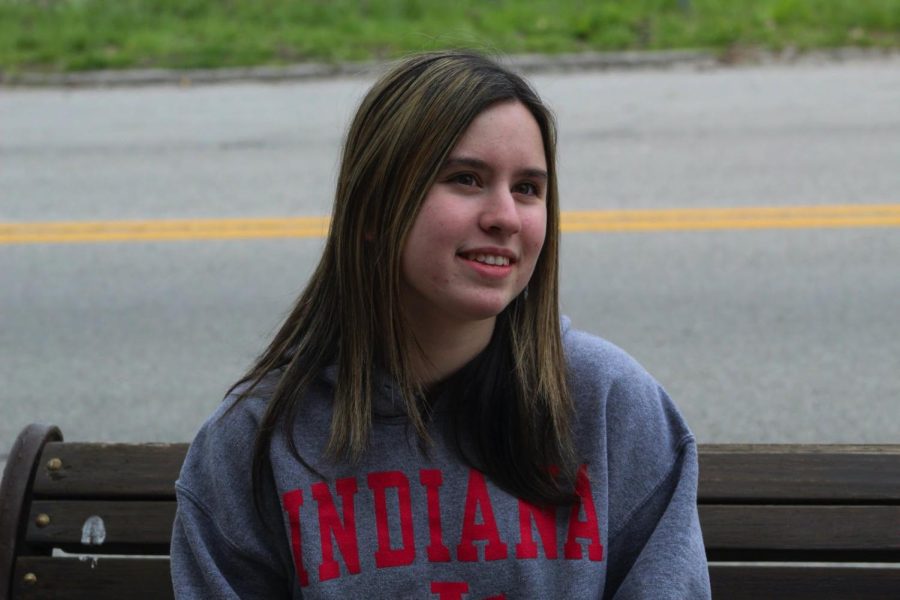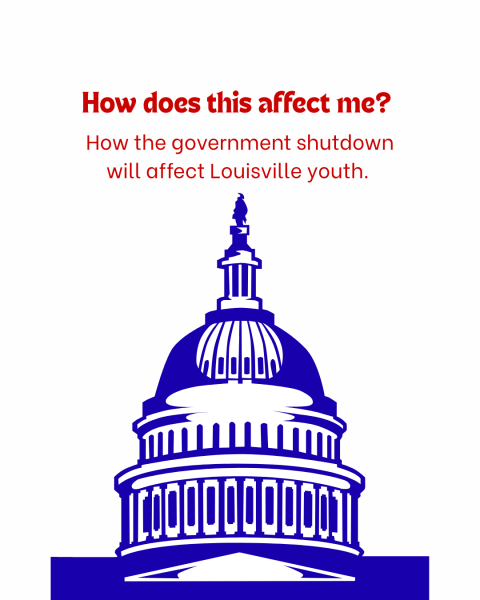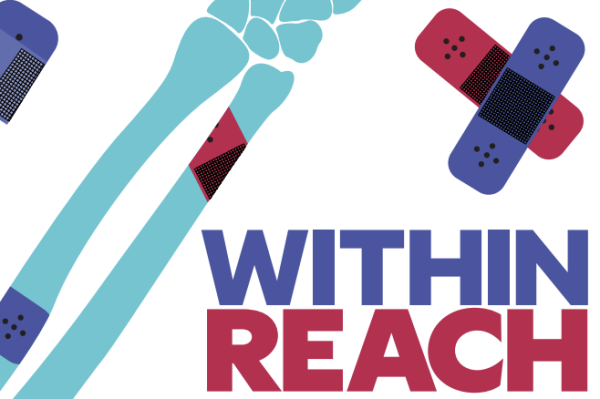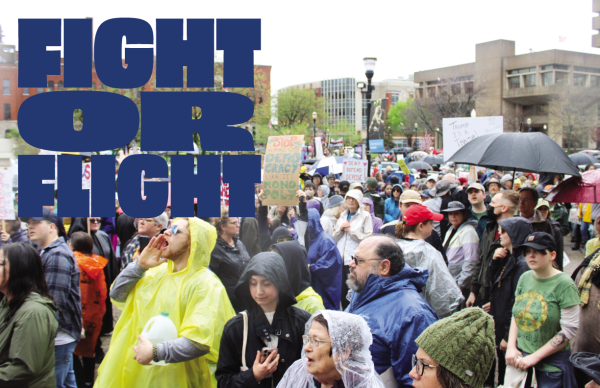Evolving Tradition
Jewish teens in Louisville navigate the role of Judaism in their lives, choosing ways to root their identity.
Photos by Erica Fields
Growing Distant. Jenna Shaps, 18, a senior at Kentucky Country Day, reflects on her family becoming less religious over the years at Bluedog Bakery and Cafe on Sunday, April 17. Photo by Erica Fields.
Every Friday evening from elementary to middle school, Jenna Shaps, an 18-year-old senior at Kentucky Country Day School, and her family piled into the car for the ride to her grandparents’ house. As children, Jenna and her brother had to be reminded to put away their toy drums and cars before dinner, but now phones were quietly tucked away without a word. Before the family sat down to eat, they gathered around the kitchen counter where three familiar items laid.
The braided, browned challah bread was freshly baked from a family recipe passed down for generations. The two Shabbat candles, lit by Shaps’ grandmother, stood proudly in their holders, flickering in the low light. The dark red wine, replaced by grape juice for the kids, waited to be opened. As everyone closed their eyes, a hush fell over the family. Once the prayer and three blessings were spoken, breaking the silence, the hectic week was closed to start one anew.
Shabbat is the Jewish practice of taking rest and devoting time to religion and family. Also called the Jewish Sabbath, Shabbat starts on Friday evening at sundown, and lasts until Saturday with three meals and a morning synagogue service in between.
The Shaps family typically devotes two hours to shutting out distractions, eating a homemade meal, and laughing together at the dinner table, where they never have a shortage of topics to discuss for Shabbat.
Since Shaps and her younger brother entered high school, though, her family’s Shabbat dinners have slowed from weekly to monthly. Shaps went to Hebrew school to learn the fundamentals of Judaism until eighth grade. She had her bat mitzvah, a celebration of entering Jewish adulthood, at 13. But at 18, Shaps describes herself and her family as less religious than when she was growing up. Instead, she finds her connection to Judaism in a community of teens in BBYO.
BBYO, formerly known as B’nai B’rith Youth Organization, is an international student-run organization for Jewish teens. The program is “the largest Jewish youth movement in the world,” explained Abigail Goldberg, the city director of BBYO Louisville.
BBYO divides large sections of the U.S. into regions. The KIO region encompasses five cities in Kentucky, Indiana, and Ohio and is one of the fastest-growing, with 300 teens and counting. Regions are then separated into city chapters and, if they have enough participants, chapters are separated into Aleph Zadik Aleph boys (AZAs) and the B’nai B’rith Girls (BBGs).
Shaps became a BBG in eighth grade to stay active in Judaism. Starting in BBYO, Shaps was looking to grow in the welcoming and reliable community, especially during the uncertainties of high school.
“The experience of being able to be in a room with 3,000 Jewish teens and being able to be my true self, and not have anybody putting me down, makes me feel like I have someone to lean on,” Shaps said.
She took multiple leadership positions, working up to run for N’siah, or president, of the KIO region in the first semester of her senior year.
Her involvement shines a light on why teens like the program, because their peers are the ones stepping up to run it. Goldberg, a BBYO alumna herself, describes her role as city director as being there to support, not to order. The leadership board of Louisville’s chapter has the freedom to recruit members, organize events, and elect new leaders.
“They’re the ones who write the script. They basically tell me what I need to buy for them because I have the credit card,” Goldberg said.
The opportunity to be involved allows those from ages 13 to 18 to feel they are represented in the Jewish community.
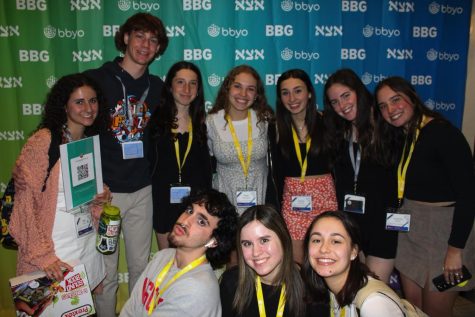
Jenna Shaps, 18, celebrates her final Spring Convention, reminiscing on her experience with BBYO on Friday, March 25. Photo courtesy of Kendall Geller.
“When I look at my synagogue, our entire board is run by people probably over the age of 75,” Shaps said. “It feels like sometimes they’re not really making decisions based on the congregation’s behalf, more on what they want and what they want to see.”
BBYO also allows teens to define their relationship with Judaism the way they want. There are three main branches of modern Judaism: Orthodox, Conservative, and Reform. Reform is the most relaxed on adhering to traditional Jewish practices and beliefs. Orthodox is a stricter adherence to tradition, such as keeping a kosher diet and separating men and women during service. Conservative, the branch Shaps grew up following, lies in the middle of the two, following the observance of some rules while letting go of others.
Members of BBYO are able to tailor their experiences to their beliefs. Some attend the religious services KIO hosts, while others use BBYO as a way to make friends with those of a similar cultural background.
“It’s more like hanging out with your friends, doing some Judaism, because that’s what connects us all together,” said Shaps.
The diversity of practices and beliefs in Louisville’s Jewish community are reflected on a larger scale in the U.S. In 2020, the Pew Research Center conducted a study surveying the demographics of the U.S. Jewish community. They found respondents were more likely to say that being Jewish is more about culture and ancestry than religion. The survey also found that one in five Jewish people expressed that being Jewish is a combination of religion, ancestry, and culture. There is no consensus on what defines a person as Jewish.
“I think it’s creating a community of people around you that have similar beliefs and cultural values than it is just about sitting and reciting prayers,” Goldberg said.
One of Shaps’ first experiences with BBYO was her regional induction five years ago. She had sat in a large circle of KIO girls, listening to BBYO’s international recruiter speaking. Each girl had a candle sitting in front of them. A hush fell over the room as the inductees waited to be called up. Hearing her name, Shaps stood in the middle of the circle holding the small, white candle. BBYO’s recruiter banged a gavel, declaring Shaps’ new status.
“By the power invested in me, I induct you, Jenna Shaps, into BBYO.”
Her candle was then lit, the flame sparking into the air. In Jewish culture, candles can be used to represent a transition. The lit candle cradled by Shaps represented the start of her new “life” in BBYO.
“It’s very, very culty. That’s the best way to describe it,” Shaps said with a laugh.
For 16-year-old Jack Kaplin, a junior taking online classes, the induction was a less somber affair. There was a firm no-talking rule, but Kaplin whispered and laughed with those near them.
“I don’t really follow that rule, because I can’t not talk,” Kaplin said.
Although Kaplin maintained a lighthearted persona, their induction was special. When they were inducted, Kaplin identified as male, making them the first boy inducted into the BBGs. The adherence to the traditional ceremony made them feel welcomed and accepted into a community they were first hesitant about.
“I had never done anything like this,” Kaplin said, recalling their first BBYO regional convention.
While their friends recited prayers with ease, the words felt unnatural to Kaplin. They had gone to Hebrew school and had their bar mitzvah at 13, but grew up in what they describe as a nonreligious household.
Each member of their family expressed their religion in different ways. Kaplin wore the Star of David necklace around their neck as a physical reminder of God. Their father read the Torah, a religious text containing the first five books of the Hebrew Bible, and prayed daily. Kaplin’s older brother was connected to Judaism by the Hebrew words inked into his skin. In eighth grade, Kaplin decided to join BBYO to meet other Jewish teens and connect with Judaism.
“It’s really what I needed, a group of people that don’t judge me for who I am and support me no matter what. At the time, I was really confused with myself and they made me feel secure,” they said.
In December 2020, Kaplin was navigating confusion about their gender identity. They started going by he/they pronouns but some friends and family stuck with using “he.”
“When people called me ‘he,’ it just didn’t feel right. I would get uncomfortable,” they said.
Kaplin started identifying as non-binary in April of last year. Although the journey has not been entirely smooth, they have gotten to a comfortable place with their gender.
“I feel really secure in my non-binary identity, and using they/them pronouns. It just feels right,” Kaplin said.
Around that time last year, Kaplin also started questioning if they still felt connected to Judaism and if they wanted to be Jewish.
“I felt the Jewish community was a community that wasn’t going to accept me. Now, thinking back to it, how would I have known that when I wasn’t putting myself out there in the Jewish community?” they said.
Like all religions, the core values of Judaism differ for each person. Kaplin has encountered accepting teachers and their parents were always supportive. But sometimes the separation between what the older and younger members believe feels vast.
“There is definitely a handful of people that I stay away from,” they said.
When Kaplin started putting themself out there in the community, they learned they couldn’t control other people’s opinions, but they could control who they surrounded themself with. Recently, Kaplin has felt a change in view in themself and their peers, especially from incoming members of BBYO.
“A lot of these things aren’t abnormal anymore. If my freshman self saw me now, my freshman self would be judging me like there is no tomorrow. Why do you dress like that, why do you do makeup? My eyes were not opened, and I feel a lot of people’s eyes now are wide open,” Kaplin said.
Kaplin believes this is because teens are having conversations about inclusivity and acceptance earlier in their lives. As a result, youth-led organizations like BBYO are being pushed to reflect on their traditions and evolve them. These new values then go on to shape the Jewish community in Louisville. But even though the community is constantly evolving, certain traditions will always be kept close.
Kaplin plans to stay connected to the culture of Judaism by meeting with their friends in BBYO while letting go of the idea of “being Jewish enough.”
“I can be Jewish, even though I am not super connected to the religious portion of it,” Kaplin said.
As for Shaps, she is taking the confidence from her leadership experiences to college. She plans to rush a Jewish sorority while continuing weekly Friday night Shabbat dinners with her college’s Hillel, a Jewish campus organization.
“Having the experience to find other Jewish teens in your community is really important and can make you find yourself,” Shaps said.
In May, Shaps will attend her last BBYO convention where she will speak to younger chapter members about her experience. She already has a long list of members to give her old KIO shirts to, in an attempt to downsize her massive collection.
As a senior, she will blow out her candle, representing how her life in BBYO is ending as she graduates and moves into a new chapter.
BBYO will stay a place teens can go to celebrate their Judaism. Although denominations, chapter numbers, and cultural values may change, the candle will be lit again for a new week, a new teen, and a new beginning.
Donations are collected through The Publishers, duPont Manual High School's booster club for J&C. On The Record relies completely on sponsorships, advertisements, and donations to produce and distribute each issue. Please consider donating to our cause, and helping the student journalists of OTR amplify youth voices for years to come.
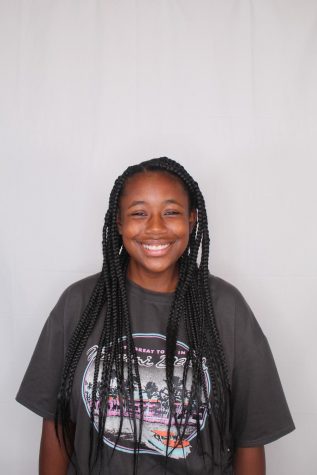
Erica Fields is senior Photo Editor for On the Record. She has a passion for telling comprehensive and compelling stories through photography and dreams...


